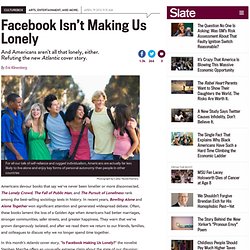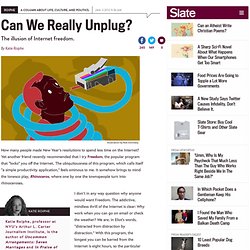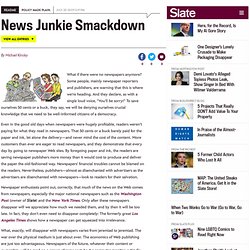

Is Facebook making us lonely? No, the Atlantic cover story is wrong. Photograph by Cathy Yeulet/Hemera.

Americans devour books that say we’ve never been lonelier or more disconnected. The Lonely Crowd, The Fall of Public Man, and The Pursuit of Loneliness rank among the best-selling sociology texts in history. In recent years, Bowling Alone and Alone Together won significant attention and generated widespread debate. Often, these books lament the loss of a Golden Age when Americans had better marriages, stronger communities, safer streets, and greater happiness. They warn that we’ve grown dangerously isolated, and after we read them we return to our friends, families, and colleagues to discuss why we no longer spend time together.
In this month’s Atlantic cover story, “Is Facebook Making Us Lonely?” Articles about American alienation may well feel true to those who long for simpler, happier times, but they’re built on fables and fantasies. I reached out to Cacioppo, who told me he does not believe Marche’s “never lonelier” thesis. The Jig Is Up: Time to Get Past Facebook and Invent a New Future - Technology. After five years pursuing the social-local-mobile dream, we need a fresh paradigm for technology startups.

Finnish teenagers performing digital ennui in 1996 2006. Reuters. We're there. The future that visionaries imagined in the late 1990s of phones in our pockets and high-speed Internet in the air: Well, we're living in it. "The third generation of data and voice communications -- the convergence of mobile phones and the Internet, high-speed wireless data access, intelligent networks, and pervasive computing -- will shape how we work, shop, pay bills, flirt, keep appointments, conduct wars, keep up with our children, and write poetry in the next century. " That's Steve Silberman reporting for Wired in 1999, which was 13 years ago, if you're keeping count.
The question is, as it has always been: now what? Decades ago, the answer was, "Build the Internet. " What we've seen since have been evolutionary improvements on the patterns established five years ago. That paradigm has run its course. Can We Really Unplug? The illusion of Internet freedom. Illustration by Rob Donnelly.

How many people made New Year’s resolutions to spend less time on the Internet? Yet another friend recently recommended that I try Freedom, the popular program that “locks” you off the Internet. The ubiquitousness of this program, which calls itself “a simple productivity application,” feels ominous to me. It somehow brings to mind the Ionesco play, Rhinoceros, where one by one the townspeople turn into rhinoceroses. I don’t in any way question why anyone would want Freedom. The name of the program has to be part of its success; it plays on our hidden desires, the better self we are hoping for, links the program in our heads to revolutions, Arab springs, Thomas Jefferson.
Here a shadowy war is evoked. Freedom from distraction may in fact be the new, sought after bourgeois luxury. What is particularly confusing about the popularity of Freedom is the simplicity of overriding it. Newspaper readers and Web surfers try to stump one another. (1) - By Tim Egan, Michael Kinsley, Michael Newman, Seth Stevenson, Sam Howe Verhovek, and Emily Yoffe. What if there were no newspapers anymore?

Some people, mainly newspaper reporters and publishers, are warning that this is where we're heading. And they declare, as with a single loud voice, "You'll be sorry! " To save ourselves 50 cents or a buck, they say, we will be denying ourselves crucial knowledge that we need to be well-informed citizens of a democracy.
Even in the good old days when newspapers were hugely profitable, readers weren't paying for what they read in newspapers. That 50 cents or a buck barely paid for the paper and ink, let alone the delivery—and never mind the cost of the content. Newspaper enthusiasts point out, correctly, that much of the news on the Web comes from newspapers, especially the major national newspapers such as the Washington Post (owner of Slate) and the New York Times. What, exactly, will disappear with newspapers varies from jeremiad to jeremiad. But how else will they be different from the newspapers of today (or a couple of years ago)?